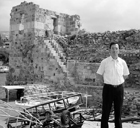Asia-Pacific
Desperate parents abandon children in Haiti
(Agencies)
Updated: 2010-05-10 14:00
 |
Large Medium Small |
On a recent afternoon, two boys waited on a bench, with dread on their faces. Their clothes were carefully folded in a Winnie the Pooh bag between them. A few paces away, in the office of the SOS orphanage, their adult older brother was reluctantly signing a Family Reunification Act.
The boys, ages 10 and 13, as well as their 3-year-old cousin had been dropped off two months earlier. The family friend who brought them lied, telling orphanage workers that their parents had died in the quake. She gave them a fake last name Milscent and coached them not to reveal their real names if questioned about their family.
In fact, their mother is alive but, like tens of thousands of others, is living in a tent city.
"They left me here because they don't have money to take care of me," said Ridial, the 13-year-old. "If I leave, will I still be able to go to school?"
|
||||
The family sleeps in a space the size of a jacuzzi tub inside a tent fashioned from a sheet wrapped around an enclosure of sticks. Their bed is a piece of cardboard. It's gotten wet so many times from rain pouring through the sheet that it lies crumpled in a heap over a broken chair.
"I don't have a job," said Jean-Phillipe Turenne, the children's 22-year-old brother. "I can't afford to take them back, but I have to. I think it's better for us to have left them there (at the orphanage)."
He said if only the boys had not revealed their real last name, the orphanage workers might not have been able to trace them. Ridial fought back tears. He said he tried to keep up the lie but couldn't keep his facts straight, and finally crumbled and told the truth.
There is very little aid workers can do to find the family of the baby found in the dumpster, who was too weak to cry when he was first rescued. He has not yet learned to speak.
Months later, the baby, named Erode, sat on his bottom playing with a styrofoam letter at the state-of-the-art Enfant Jesus orphanage, where children are tended by a bevy of attentive nannies.
He extended the letter C to one of the nannies - only to pull it back as soon as she reached for it. He exploded into a burst of giggles.
He is fed two healthy meals a day and sleeps in a crib with gleaming white bars. The nannies take turns cuddling him and have been trained in the importance of eye contact as well as 'reciprocal play,' where they coo at him to mimic the attention he would receive from his mother.
"These children have won the jackpot to get to be here," said Indiana-based child psychologist Mary Kate Bristow, who flew in to offer her service. "If I was living in a tent, I too would try to get my child here."
Next to Erode is a toddler whose leg had to be amputated. His mother begged the orphanage to take him, saying she couldn't care for him, said executive director Gina Duncan.
In another crib is a baby girl who spent three days under the rubble. By the time they got her out, the ants had started eating her eyes. She isn't an orphan either, her grandmother was in the hospital recovering after the house collapsed on top of her.
And then there is 13-year-old Simon, who was left at the orphanage shortly after the quake. For the first time in his life, he ate until he felt full. He began attending school.
He recently sat inside the orphanage's main office next to his older sister, who had come to reclaim him. He tried to hide his tears by pulling up his T-shirt over his nose. When he couldn't hold it in any longer, he laid his cheek on the armrest of the couch, and his tears pooled on the imitation leather.
"If I go back with my big sister, I won't be able to go to school. She's going to make me sell water in the street like I was doing before," he said. "I'll go back to a hard life."
Sniffling, he was led out of the orphanage.










